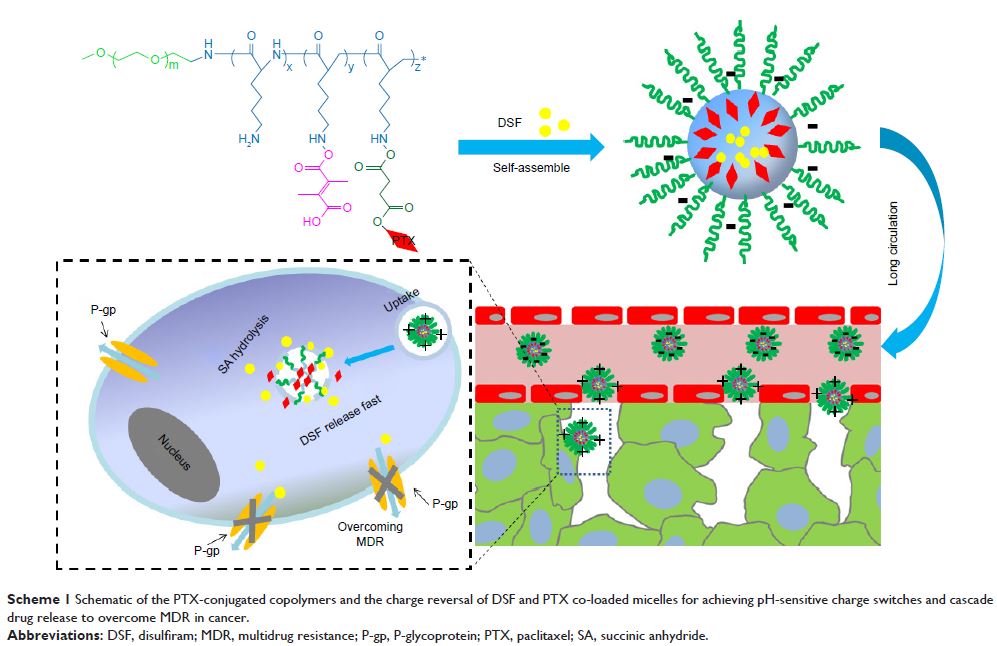108985
论文已发表
注册即可获取德孚的最新动态
IF 收录期刊
- 3.4 Breast Cancer (Dove Med Press)
- 3.2 Clin Epidemiol
- 2.6 Cancer Manag Res
- 2.9 Infect Drug Resist
- 3.7 Clin Interv Aging
- 5.1 Drug Des Dev Ther
- 3.1 Int J Chronic Obstr
- 6.6 Int J Nanomed
- 2.6 Int J Women's Health
- 2.9 Neuropsych Dis Treat
- 2.8 OncoTargets Ther
- 2.0 Patient Prefer Adher
- 2.2 Ther Clin Risk Manag
- 2.5 J Pain Res
- 3.0 Diabet Metab Synd Ob
- 3.2 Psychol Res Behav Ma
- 3.4 Nat Sci Sleep
- 1.8 Pharmgenomics Pers Med
- 2.0 Risk Manag Healthc Policy
- 4.1 J Inflamm Res
- 2.0 Int J Gen Med
- 3.4 J Hepatocell Carcinoma
- 3.0 J Asthma Allergy
- 2.2 Clin Cosmet Investig Dermatol
- 2.4 J Multidiscip Healthc

pH 引发的表面电荷可转换性聚合物胶束,用于共同传递紫杉醇/双硫仑,并克服癌症中的多药物抗性
Authors Huo Q, Zhu J, Niu Y, Shi H, Gong Y, Li Y, Song H, Liu Y
Received 20 June 2017
Accepted for publication 23 August 2017
Published 4 December 2017 Volume 2017:12 Pages 8631—8647
DOI https://doi.org/10.2147/IJN.S144452
Checked for plagiarism Yes
Review by Single-blind
Peer reviewers approved by Dr Govarthanan Muthusamy
Peer reviewer comments 4
Editor who approved publication: Professor Dongwoo Khang
Abstract: Multidrug resistance (MDR) remains a major challenge for providing
effective chemotherapy for many cancer patients. To address this issue, we
report an intelligent polymer-based drug co-delivery system which could enhance
and accelerate cellular uptake and reverse MDR. The nanodrug delivery systems
were constructed by encapsulating disulfiram (DSF), a P-glycoprotein (P-gp)
inhibitor, into the hydrophobic core of poly(ethylene glycol)-block -poly(l-lysine) (PEG-b -PLL) block copolymer micelles,
as well as 2,3-dimethylmaleic anhydride (DMA) and paclitaxel (PTX) were grafted
on the side chain of l-lysine simultaneously. The surface charge of the
drug-loaded micelles represents as negative in plasma (pH 7.4), which is
helpful to prolong the circulation time, and in a weak acid environment of
tumor tissue (pH 6.5–6.8) it can be reversed to positive, which is in favor of
their entering into the cancer cells. In addition, the carrier could release
DSF and PTX successively inside cells. The results of in vitro studies show
that, compared to the control group, the DSF and PTX co-loaded micelles with
charge reversal exhibits more effective cellular uptake and significantly
increased cytotoxicity of PTX to MCF-7/ADR cells which may be due to the
inhibitory effect of DSF on the efflux function of P-gp. Accordingly, such a
smart pH-sensitive nanosystem, in our opinion, possesses significant potential
to achieve combinational drug delivery and overcome drug resistance in cancer
therapy.
Keywords: pH response,
charge reversal, multidrug resistance, paclitaxel, disulfiram
